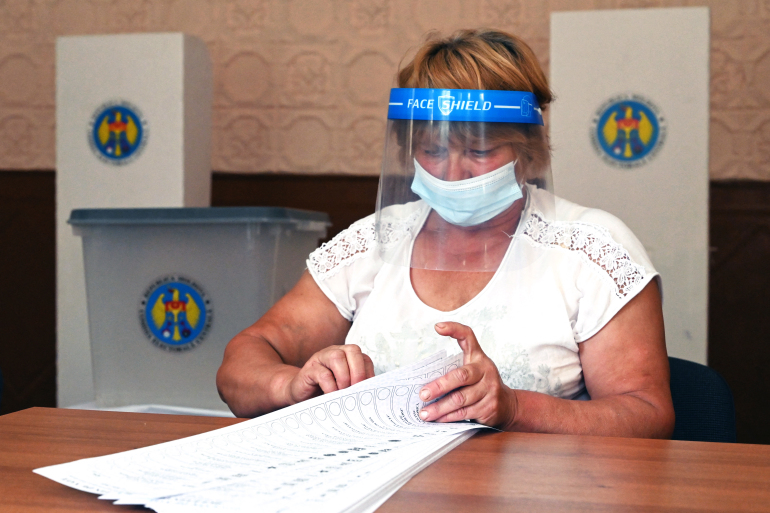By Victoria Olari (Institute for Strategic Initiatives)
While the whole of Europe was watching the EURO 2020 final on Sunday night, somewhere in Eastern Europe there was a no less spectacular fight.
Early parliamentary elections took place in the Republic of Moldova on July 11th. The vote was called by President Maia Sandu, thus fulfilling one of her main promises in the 2020 presidential campaign, to give citizens a chance to elect a new clean parliament. Moldova is lacking a formal government since December 23 2020, after the government backed by the socialist party resigned.
Following the early parliamentary elections of July 11, Maia Sandu’s pro-European party PAS wins a landslide victory against the Russian-backed Socialist and Communist bloc (BECS), leading in 26 districts out of 36, including diaspora. So far, only three parties have entered the parliament PAS 52.49%, BECS 27.39%, Sor Party 5,78%. Which means that PAS got a comfortable majority (63 seats out of 101) to form the government.
This guarantee the current pro-European president Maia Sandu, who enjoys the confidence of most of the Moldovan population, a stable parliamentary majority that will vote on reforms to advance European integration and a well-prepared government to implement these reforms. It is worth mentioning that it is for the first time in the history of the Republic of Moldova that a pro-european /center-right party manages to gain a parliamentary majority on its own.
All pre-election polls predicted that the fight would be between the PAS and the Socialist and Communist Bloc. The only question was what the difference would be, and if anyone else could make it to Parliament. Although the trends were clear, the result still exceeded all expectations.
What actually happened?
Having a campaign largely based on fighting corruption and ensuring the rule of law, PAS detach themselves from the classic geopolitical message West vs. Russia. This strategy also proved to be efficient during the presidential campaign, managing to attract even a part of the Russian-speaking electorate with moderate geopolitical visions.
On the other side, the bloc of socialists and communists acted based on their old strategy of antagonizing the electorate. “Moldova is in danger” and “We do not give the country to foreigners” were slogans aimed at mobilizing their voters. In the well known maner, they also campaigned on traditional family values and closer ties with Russia.
As a result, PAS managed a spectacular victory even in traditional socialist districts, less from ATU Gagauzia and the Transnistrian region. It seems that Moldovans no longer believe in scarecrows and fake propaganda, instead they are eager for radical changes. Moldovans in the diaspora also mobilized unprecedentedly, with a record number of votes ever cast in parliamentary elections. A total of 212 145 Moldovans expressed their voting rights, weighing almost 16% of the total number of votes. As expected, 86.23% of these people voted for PAS. This is the first time when PAS has managed the performance of attracting votes from all age groups, regardless of education level or geographical position. They also attracted the entire unionist electorate, which this time boycotted the parties that openly plead for reunification with Romania.
Another surprise of these elections is that only one other party managed to enter parliament. While the Sor Party hardly passed the 5% electoral threshold, Renato Usatii’s party was left out. It’s hard to believe, given that not so long ago, he was the 3rd favorite in the presidential election. This crushing loss did not go unnoticed. The day after the elections, Renato Usatii announced that he is resigning from the position of mayor of Balti, the second largest city in Moldova, called the northern capital. Unfortunately, the PPDA, the traditional allies of PAS, did not manage to enter the parliament either
It should be mentioned that in total, 24 contestants participated in this election campaign, many of them being spoiler parties meant to disperse the pro-European vote. The vote, however, was like never concentrated in one “basket”, with many people preferring to give so-called the “useful vote”.
What’s next?
The results of these elections did nothing but reconfirm the support of the citizens for Maia Sandu’s reform program. In order to fulfill it, she needed a Parliament to support her on this difficult path. Being asked on election day who she voted for, Maia Sandu said “I voted for an honest parliament, with which I can work, together with the government, for the good of the citizens.”
Now on Maia Sandu’s shoulders lies an enormous responsibility: PAS holding leadership of all three institutions, the Presidency, the Parliament and the Government, PAS can no longer have any excuse for not delivering the promised results. In addition, they have at their disposal not only the trust of Moldovan citizens but also the support of the most important external actors, such as the EU and the USA.
The EU has many instruments at its disposal, which are not only financial, but also political related. It has a unique capacity to endorse the changes in Moldova with adoption of an upgraded strategy for accelerated integration. By taking a comprehensive approach, this could be an essential UE reform booster for the Republic of Moldova.
Photo source: https://www.aljazeera.com/news/2021/7/11/polls-open-in-moldovas-snap-election-amid-corruption-concerns


